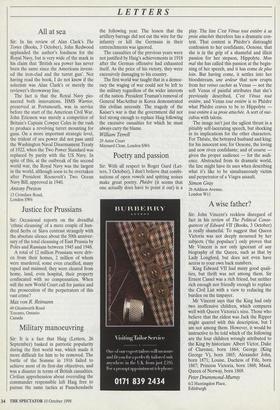Military manoeuvring
Sir: It is a fact that Haig (Letters, 26 September) basked in patriotic popularity during the first world war, which made it more difficult for him to be removed. The battle of the Somme in 1916 failed to achieve most of its first-day objectives, and was a disaster in terms of British casualties. Civilian apprehension about overruling the commander responsible left Haig free to pursue the same tactics at Passchendaele the following year. The lesson that the artillery barrage did not cut the wire for the infantry or kill the Germans in their entrenchments was ignored.
The casualties of the previous years were not justified by Haig's achievements in 1918 after the German offensive had exhausted itself. As the price of his victory, they were excessively damaging to his country.
The first world war taught that in a democ- racy the waging of war could not be left to the military regardless of the wider interests of the nation. President Truman's removal of General MacArthur in Korea demonstrated this civilian necessity. The tragedy of the Kaiser's war is that the government did not feel strong enough to replace Haig following the excessive casualties for which he must always carry the blame.
William Terrell
29 Astor Court Maynard Close, London SW6










































































 Previous page
Previous page